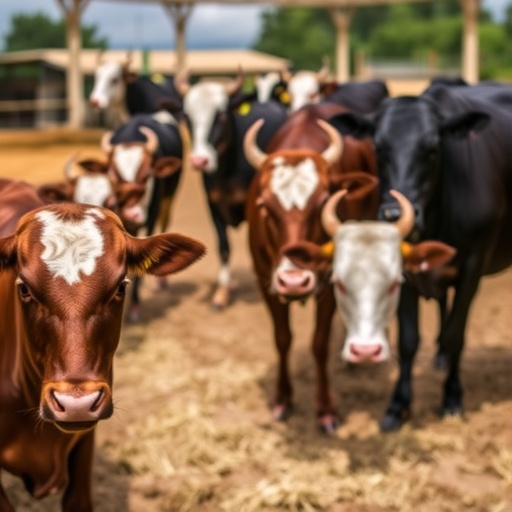Rising temperatures have become an undeniable reality in today’s world, creating an urgent need for reevaluation and adaptation in agriculture, particularly in regions vulnerable to climate change. A recent study by K. Umashankar investigates the intricate relationship between climate risk and cattle farming in tropical island economies. The research delves into how rising temperatures not only threaten the productivity of livestock but also pose economic challenges, emphasizing the need for resource reallocation to mitigate these impacts.
Tropical islands, often characterized by limited land and water resources, are particularly susceptible to extreme weather events and gradual climate shifts. As temperatures continue to rise, the direct consequences of heat stress on cattle health are alarming. Heat stress can lead to reduced milk production, lower reproductive efficiency, and higher susceptibility to diseases among livestock. Farmers face significant hurdles in maintaining herd health and productivity, which in turn affects their livelihoods and the local economy.
To combat the adverse effects of climate change, farmers must consider adaptive strategies, including changing breed selections and improving animal husbandry practices. The reallocation of resources, such as shifting investments toward climate-resilient breeds or advanced cooling systems, can help mitigate the impacts of heat stress on cattle. These adaptations require not only financial resources but also a shift in mindset among farmers and stakeholders, recognizing that proactive measures are essential in an era of climate uncertainty.
The economic implications of inaction are profound. The cattle farming sector is a crucial contributor to the economies of many tropical island nations, providing jobs and food security. As climate change alters the landscape of agriculture, the potential for economic loss is staggering. Lower productivity from heat-stressed livestock can lead to decreased income for farmers and increased food prices for consumers. Therefore, addressing climate risks is not just about environmental sustainability; it is also essential for economic stability and growth.
In addition to direct impacts on cattle, rising temperatures also influence the availability and quality of feed resources. Heat tends to exacerbate challenges related to water scarcity, which is already a critical issue in many tropical areas. As droughts become more common, the ability to cultivate pasture and forage diminishes, leading to higher costs for feed and potentially unsustainable farming practices. This cycle of scarcity can threaten the viability of cattle farming altogether if not addressed.
Umashankar’s research emphasizes the interconnectedness of ecological health and economic viability. The study recognizes that managing the impact of rising temperatures goes beyond individual farms; it requires coordinated efforts at governmental and community levels. Policies that support sustainable farming practices, enhance irrigation systems, and promote research into climate-resilient agricultural technologies can be instrumental in safeguarding both cattle farming and the broader economy.
Another critical aspect highlighted in the study is the role of education and knowledge dissemination among farmers. Implementing adaptive management practices depends heavily on the knowledge and capabilities of farmers to respond to climate challenges. Educational programs focused on climate-smart agriculture, including training in alternative farming techniques and offering insights into genetic advancements in livestock breeds, can empower farmers to make informed decisions.
Mental and emotional health also plays a crucial role in the adaptability of farmers facing the stress of changing climate conditions. The uncertainty associated with climate risks can create feelings of anxiety and helplessness, hindering effective decision-making. Therefore, support systems for mental health, alongside practical agricultural advice, are crucial for fostering resilience within farming communities.
Furthermore, collaboration across sectors can facilitate innovation and resource sharing. By integrating efforts among agricultural scientists, government agencies, and farmers, more effective solutions to climate-related challenges can be developed. Public-private partnerships can help finance initiatives aimed at improving cattle farming resilience while sharing best practices on resource allocation that consider ecological and economic impacts.
The implications of Umashankar’s study extend beyond the immediate agricultural sector. Addressing climate risks in cattle farming has the potential to contribute to broader initiatives aimed at achieving food security and sustainable economic development. Tropical island economies must adapt to changing realities or risk falling behind in an increasingly competitive global market.
In summary, K. Umashankar’s research sheds light on the intricate relationships between climate change and the cattle farming sector in tropical island economies. It calls for a holistic approach that encompasses ecological sustainability, economic resilience, and community support. By prioritizing proactive measures, such as resource reallocation, farmer education, and collaborative practices, we have the opportunity to safeguard this crucial sector against the impending challenges posed by climate change.
The path forward is not only about mitigating risks but also about embracing the opportunities presented by innovation and resilience. As we stand at the crossroads of climate action and economic imperatives, the time has come to reimagine farming practices that honor both the environment and the livelihoods of those who rely on it.
In this age of rising temperatures, the actions we take today will shape the future of cattle farming in tropical island economies for generations to come. Collective efforts and shared knowledge will be essential components in creating a resilient agricultural landscape that can withstand the challenges posed by climate change.
This is a crucial moment for farmers, scientists, and policymakers to unite in their commitment to sustainable practices that will ensure the longevity of cattle farming amidst escalating climate uncertainties.
Ultimately, as Umashankar’s findings suggest, the time for action is now, and the choices made today will determine the sustainability of agriculture in our planet’s most vulnerable regions.
Subject of Research: Economic and ecological impacts of rising temperatures on cattle farming in tropical Island economies.
Article Title: Resource reallocation under climate risk: assessing the economic and ecological impacts of rising temperatures on cattle farming in tropical Island economies.
Article References: Umashankar, K. Resource reallocation under climate risk: assessing the economic and ecological impacts of rising temperatures on cattle farming in tropical Island economies. Discov Agric 3, 247 (2025). https://doi.org/10.1007/s44279-025-00419-w
Image Credits: AI Generated
DOI: https://doi.org/10.1007/s44279-025-00419-w
Keywords: Climate change, cattle farming, tropical islands, economic impacts, ecological impacts, resource reallocation, sustainable agriculture, farmer education, climate-smart practices, adaptive management.




